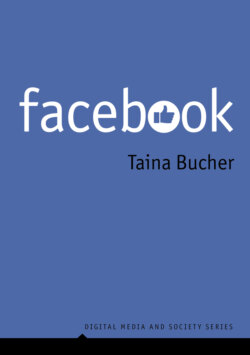
Реклама. ООО «ЛитРес», ИНН: 7719571260.
Оглавление
Taina Bucher. Facebook
Table of Contents
Guide
Pages
Series Title. Digital Media and Society Series
Copyright Page
Acknowledgements
Introduction: Facebook is Facebook
Facebook is Facebook
Feeling Facebook
Origin story
A guidebook to Facebook?
It’s complicated
Facebook is everything
Book outline
Notes
chapter one Metaphors at work: Framing Facebook
From town square to living room
Techno-utopianism and the open internet
Move fast and break things
Metaphors at work
Concluding remarks
Notes
chapter two Of electricity and chairs: Facebook as infrastructure
Electric light
Chairs
Concluding remarks
Notes
chapter three Grounded in reality: How Facebook programs sociality
How networks became social and online identity grounded in reality
Whose authenticity?
The big business of friendship
Communal aspects of friendship
Friendship as work
Facebook identity – what’s in a name?
Concluding remarks
Notes
chapter four Engineering a platform: Facebook’s techno-economic evolution
News Feed: Your personal newspaper
News journalism as the model
The algorithmic logic of Facebook
Building an empire, becoming a platform
Platform programmability
The mobile revolution
Concluding remarks
Notes
chapter five Monetizing You: Facebook’s advertising ecosystem
Monitoring and targeting YOU: The rise of behavioural advertising
Facebook, the ad company
Facebook ads from the advertiser’s perspective
Why users are shown specific ads
Concluding remarks
Notes
chapter six Personalized politics: Facebook’s profiling machinery
The politics of the political
Elections and political campaigns
Facebook’s central role in data-driven campaigning
Regimes of experimentation
Political advertising on Facebook
Platform governance and content moderation
The politics of the polluted information ecology
Haunted data: Cambridge Analytica and the inertia of infrastructure
Facebook in the wild: The case of dangerous speech in Myanmar
Concluding remarks
Notes
Conclusion: The many faces of Facebook
Facebook as a hyperobject
Becoming new
More-than-social media
Possibilities for the future
Notes
References
Index
POLITY END USER LICENSE AGREEMENT
Отрывок из книги
taina bucher
Status update: Thank you to everyone who has either explicitly or implicitly contributed to developing the ideas in this book. Thank you: Anne Helmond, David Nieborg, my colleagues in the ‘Don’t take it personal’ project team, and the participants from the Media Aesthetics seminars at the Department of Media and Communication, University of Oslo, for reading drafts at various stages of completion and providing critical feedback. Your comments have greatly improved the final product. Thank you also to the anonymous reviewers for their time and efforts in making this a better book. I am grateful to the many people I have met at conferences, workshops, and seminars, who have provided crucial insights into different aspects of Facebook. I am especially grateful to the informants from various NGOs and human rights organizations whose input and generosity helped to shape my understanding of Facebook. Thank you also to research assistant Louise Bechmann Ødegaard Jensen for her research in the early stages of book writing. This book benefited from financial support by the ‘Digitization and Diversity’ project funded by the Research Council of Norway. Thank you to project leader Anne-Britt Gran for granting the time and resources to work on this book as part of the project.
.....
In an attempt to frame the new Like button as a service to Facebook’s users, Pearlman strategically describes it as an overly positive metric. Of course, as has been raised time and again since, there was never an option to dislike, which would be the equivalent of being able to give a restaurant a one-star rating. While the concept of rating and numbering is hugely controversial (Espeland and Sauder, 2007; Esposito and Stark, 2019), it would be safe to say that the ability to hand out a five-star rating is worth nothing without the ability to also hand out a one-star rating. Yet, as Esposito and Stark remind us, ratings never mirror reality but need to be seen as second-order observations. Ratings function not to ‘inform us about how things are but because they provide an orientation about what others observe’ (2019: 3). Herein also lies the value for Facebook. Providing a Like button was not about mirroring reality but about orientation, creating a positive feedback mechanism that essentially circulates value to advertisers. The discursive construction and the use of metaphor in Perlman’s official announcement of the Like button is ultimately about corporate storytelling. Not only is Pearlman’s analogy wrong, but the ex-Facebook employee later professed regret for having played a role in creating one of the most addictive feedback loops in the advertising economy (Lewis, 2017; Karppi and Nieborg, 2020). Comparable to a five-star rating, the Like button isn’t like the restaurant rating on a reviews site. What Pearlman, Bosworth and the others conceived of back then is more akin to the reviews one would find in a travel guidebook. The whole idea behind guidebooks is to provide a selection of the best tips – or have you ever travelled to a new city with a guidebook full of mediocre suggestions?
Let’s stay with the guidebook metaphor a while longer. If the Like button laid the foundation for a carefully engineered attention economy centred on advertising, where is the guidebook for? Put differently, if we were to imagine Facebook as a geographical destination, where, in the travel book section, would we find its guidebook? Would it be like a city, or a state? Would Facebook even warrant a whole continent? And if we were to imagine a guidebook to the internet, where would Facebook be located? Would it be a website with a dedicated URL, under the apps section, a protocol or something else entirely? Media scholar Siva Vaidhyanathan (2018) calls Facebook the greatest contender for becoming the operating system of our lives. The repercussions of this are much greater than competing for people’s laptops or mobile devices. Acting as the operating system of people’s lives means having the power to ‘measure our activities and states of being and constantly guide our decisions’ (p. 99). As Vaidhyanathan contends, Facebook is:
.....